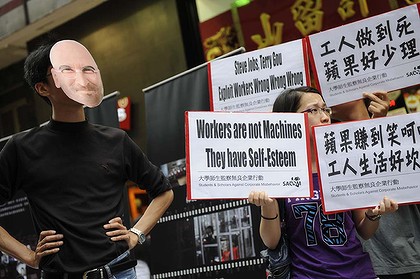 Working Blog:
Working Blog:
Apple has continued to use a Chinese contractor, Foxconn, to produce its iPads and iPhones, despite allegations of the company's horrific workers’ rights abuses. Foxconn routinely forces it workers to work two to three times the legal Chinese limit and to work in brutal and often unsafe conditions that have led to many accidents, as Michelle Chen reported for Working In These Times. These working conditions led to 10 Foxconn worker suicides at the company's Shenzhen facility in 2010 alone.
The suicide problem at Foxconn’s Chinese factories became so bad that the company put up steel wire to prevent workers from jumping and killing themselves. In June 2010, the same month that Jobs unveiled a new version of the wildly successful iPhone, the UK's Daily Mail newspaper published a disturbing undercover report on conditions within Foxconn's massive factory complex in Shenzhen. It's worth quoting at length:
[W]e encountered a strange, disturbing world where new recruits are drilled along military lines, ordered to stand for the company song and kept in barracks like battery hens - all for little more than £20 a week.
In what's been dubbed the 'i-Nightmare factory', the scandal focuses on two sprawling complexes near Shenzhen, two decades ago a small fishing port and now a city of 17 million people.
This is the epicentre of operations for Foxconn, China's biggest exporter, which makes products under licence for Apple using a 420,000-strong workforce in Shenzhen. They have 800,000 workers country-wide.
And as Jobs was speaking in San Francisco [while announcing the iPhone], new measures were being secretly introduced at Foxconn to prevent the suicide scandal from worsening and damaging Apple sales globally.
Astonishingly, this involves forcing all Foxconn employees to sign a new legally binding document promising that they won't kill themselves.
Instead of cancelling its contract with Foxconn and moving production back to the United States, Apple hired a team of suicide prevention specialists to make recommendations including “better training for hotline staff and care center counselors and better monitoring to ensure effectiveness.”
On the home front, the company's labor practices are also far from perfect, as a recent organizing drive by Apple’s retail workers has brought to light. At its retail stores, the company prefers to hire part-time workers and keeps many employees working part-time who wish to be full-time employees. As a result, many workers cannot afford to buy Apple’s health insurance, as Josh Eidelson reported last month for Working In These Times.
Continue reading here.
No comments:
Post a Comment
Note: Only a member of this blog may post a comment.